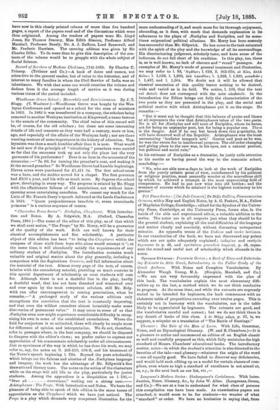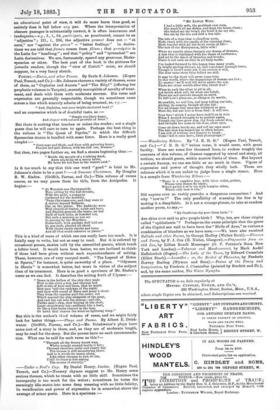Chaucer : The Tale of the Man of Lawe. With
Life, Grammar, Notes, and an Etymological Glossary. (W. and R. Chambers.)—It is a pleasure to notice and recommend an edition of. an English classic so well and carefully prepared as this, which fully maintains the high standard of Messrs. Chambers' educational books. The introductory matter, notes—in which the student's attention is also directed to the beauties of the tale—and glossary—whatever the origin of the word —are all equally good. We have failed to discover any deficiencies, and would hold such editing up as a model for certain classes of com- pilers, even where so high a standard of excellence is not aimed at, as, e.g., in the next book on our list, viz ,—
Longman's Modern Series : Shakespeare's Coriolanus. With Intro- duction, Notes, Glossary, &c., by John W. Allen. (Longmans, Green; and Co.)—We are at a loss to understand for what class of persons this compilation can have been made. As examination papers are attached, it would seem to be for students—we wonder of what "standard" or order. We have no hesitation in saying that from an educational point of view, it will do more harm than good, so entirely does it fall below any par. Where the interpretation of obscure passages is substantially correct, it is often inaccurate and • inadequate,—e.g, I., i., 94, participate, as punctuated, cannot be an " adjective " ; III., i., 256, the adjective present does not = "at once," nor "against the grain" = "better feelings." In deriva- tions we are told that fiamen comes from Pill= ; that prcecipitis is the Latin for " headlong" ; and that "policy" and " tyrannioal " are Latin derivatives. We are, fortunately, spared any grammar, Shake- spearian or other. The best part of the book is the pictures for juvenile readers, though the "view of Corioli " must, we should suppose, be a very fancy sketch.



































 Previous page
Previous page